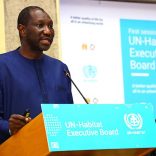Termination of allowances for Mozambican medical interns seems irreversible; the consequences ...
Obesity is a public health problem in Mozambique

Photo: O País
Excess weight, breathing difficulties and poor sleep quality are among the main signs of obesity, nutritionist Orlanda Dias said on STV’s “Manhã Informativan” this Friday.
Dias characterised obesity in Mozambique as a public health problem of pandemic proportions, with a growing number of individuals diagnosed with the disease.
A formula for calculating the body mass index (BMI) as the ratio of an individual’s weight in kilograms divided by the height in meters squared makes it possible to determine whether the individual is obese or not and the type of obesity he or she presents.
“There are several classifications in determining obesity, among which are homogeneous obesity, in which the individual has excess weight throughout the body; gynecoid obesity, in which the individual gains a body shaped like an apple; and android obesity, more frequent in women, which shows more in the hips, presenting a pear shape,” the specialist explained.
The nutritionist pointed out that there is even a tendency towards obesity in children, due to the eating habits they display. “Many parents spend more on processed foods, to the detriment of organic ones, which are healthier. These eating habits end up triggering childhood obesity,” Dias explained.
Regarding the causes, Dias says that the day-to-day dynamics of families has greatly influenced the lifestyle they lead, especially in terms of food. Industrialised foods, excessive alcohol consumption, lack of physical exercise and smoking are at the forefront of the causes of obesity.
“We must also highlight the genetic issue, a family history of obesity, which is, in itself, a warning to adopt healthy eating habits to avoid contracting obesity. We can also highlight some medications, some contraceptives, for example, which may trigger obesity, and stress, among other factors,” Dias says.
“Obesity increases the risk of developing more serious and fatal diseases, such as hypertension, cardiovascular disease and even cancer. We can also get high cholesterol, experience breathing disorders and difficulties in performing physical activity.”
According to Dias, minimising the risk of developing obesity involves adopting a healthy lifestyle, eating foods rich in nutrients, energy and minerals, a balanced diet including vegetables and vegetables without restrictions, and regular physical exercise.
The nutritionist advises anyone who is overweight to approach a health unit in order to get a diagnosis, and then start treatment according to the type of obesity they present.
By Inalcídio Uamusse













Leave a Reply
Be the First to Comment!
You must be logged in to post a comment.
You must be logged in to post a comment.